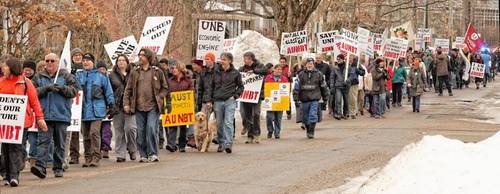 Photo of a picket line
Photo of a picket line
Stand! Fight! University of New Brunswick Union On Strike
By Queen Arsem-O'Malley
Temperatures hovered just above freezing in New Brunswick last week, and yet a group of people at the Fredericton, Saint John and Moncton campuses of the University of New Brunswick spent days standing outside.
That group was hundreds of the professors, librarians, and researchers from the Association of University of New Brunswick Teachers (AUNBT). The union declared a strike on Monday, after working without contracts since March, and stalled negotiations with University administration.
The university issued a lockout order for union members, which has taken effect both physically and digitally, as strikers have been shut out of campus and out of their UNB emails. UNB has also hired a private security firm, AFIMAC, which brands itself as strike security. While picketers have remained peaceful, the AUNBT Facebook page discussed reports from students that they were intimidated by AFIMAC employees while they were holding up a banner.
Negotiations between the university and the union broke down over several issues, the main issue being full-time salaries. UNB salaries are lower than comparable universities in Canada, a group of universities known as G14. The university claims that it cannot afford to meet the union’s salary demands, though AUNBT President Miriam Jones begs to differ. In a December interview with the New Brunswick Media Co-op, Jones pointed to the UNB administration’s spending priorities, citing the fact that UNB has lost 48 full-time academic positions in the last ten years, and yet, has added more than 80 non-academic positions.
English Department Chair Jennifer Andrews, who is also on a communications committee for strike headquarters, explained that the issue of salary is tied to UNB’s ability to recruit and retain talent amongst professors. She also said that professors are concerned about increased workload, and that UNB’s refusal to use comparisons to G14 universities leaves workers without guarantee that their standards will be competitive.
While the strike continues, classes are suspended, leaving a campus that Andrews called “a ghost town”. Media attention has largely been focused on student reaction to the strike and concerns about an extended semester, though many students have demonstrated solidarity with professors, including Facebook pages dedicated to supporting the strike and students joining their professors on picket lines. On January 16, a group of graduate students picketed UNB President Eddy Campbell’s university-owned mansion, where they demanded better pay for professors and cited the $160,000 recently spent on porch repairs for the house.
Several unions, both on UNB campuses and from across Canada, have expressed support for the strike. Faculty from 11 Canadian universities rallied on Friday in Fredericton, and unionized UPS drivers have refused to cross picket lines to deliver to UNB campuses. The Brunswickian, a student publication at UNB, reported that AUNBT received over $1 million in donations at the rally, including money from the New Brunswick Nurses Union and the Canadian Association of University Teachers Defence Fund.
This is the first time that AUNBT has gone on strike, though other Canadian campuses have seen several strikes in recent years. Last January, St. Francis Xavier University saw the St. FX Association of University Teachers – comprising faculty, librarians, lab staff and extension staff – strike for three weeks. In the fall of 2011, McGill University non-academic workers were on strike for four months. The winter of 2008-9 at York University was marked by a 12-week strike by 3,400 teaching assistants, contract faculty and graduate assistants, which was only ended by a back-to-work bill in the Ontario legislature. And during the winter previous to that, in 2007-8, faculty at UNB neighbor St. Thomas University were on strike for 44 days before agreeing to binding arbitration. There has never been a strike that resulted in a cancelled semester for Canadian students.
Andrews expressed sympathy and concern for students affected by the strike, but said that their support has shown that they understand the severity and scope of the issues that led to strike action.
“What I’ve seen over the last decade is a continued drain of resources away from students, staff, and buildings,” Andrews said. She talked about the support that the union has received, saying that the strike has been a good experience for union members to meet each other as well as supporters. “A lot of the students get it, a lot of the community gets it.”
Like this article? Chip-in to help us sustain youth-powered independent media!
Queen Arsem-O'Malley
once I was cited on wikipedia
Catch up with me @qaween.

